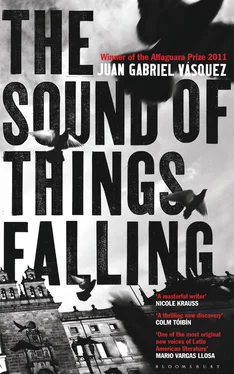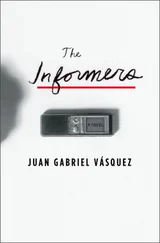When I woke up, it was still dark. I didn’t know how much time had passed. I hadn’t been woken by the light, or the sounds of the tropical dawn, rather by the distant murmur of voices. I followed the sounds to the living room and was not surprised to find her as I did, sitting on the sofa with her head in her hands and a recording playing from her tiny stereo. I didn’t have to hear more than a few seconds, only a couple of those phrases spoken by strangers in English had to reach me to recognize the recording, for deep down I’d never stopped hearing that dialogue that spoke of weather conditions and then of work and of how many hours pilots could fly before they were obliged to rest, deep down I recognized it as if I’d heard it yesterday. ‘Well, let’s see,’ said the first officer just as he’d done some time ago, in Consu’s house. ‘We’ve got 136 miles to the VOR, and 32,000 feet to lose, and slow down to boot so we might as well get started.’ And the captain said, ‘Bogotá, American nine six five request descent.’ And Operations said, ‘Go ahead, American nine six five, this is Cali ops.’ And the captain said, ‘All right, Cali. We will be there in just about twenty-five minutes from now.’ And I thought, just as I’d thought before: No you won’t. You won’t be there in twenty-five minutes. You’ll be dead, and that will change my life .
Maya didn’t look at me when I sat down beside her, but she lifted her face as if she’d been waiting for me, and on her cheeks I saw the trail of her tears and I stupidly wanted to protect her from what was going to happen at the end of the tape. They’d be parking at gate two and landing on runway zero one, the plane’s headlights were on because there was a lot of visual traffic in the area, and I sat beside Maya on the sofa and put my arm around her back and hugged her and held her close to me, and the two of us sank into the sofa like a couple of old insomniacs, that’s what we were, an old married couple who can’t sleep and meet like ghosts in the early hours to share their insomnia. ‘I’m going to talk to the people,’ said the voice, and then, ‘Ladies and gentlemen, this is your captain. We have begun our descent.’ And then I felt her sob. ‘There goes my mom,’ she said. I thought she wouldn’t say anything else. ‘She’s going to be killed,’ she said then, ‘she’s going to leave me all alone. And I can’t do anything, Antonio. Why did she have to be on that flight? Why didn’t she get a direct flight? How much bad luck can one person have?’ and I held her, what else could I do but hold her tight, I couldn’t change what had happened or stop the flow of time on the tape, time that advanced towards what had already happened, towards the definitive. ‘I’d like to wish everyone a very, very happy holiday and a healthy and prosperous 1996,’ the captain said from the tape. ‘Thank you for flying with us.’
And with those false words — the year 1996 would not exist for Elaine Fritts — Maya went back to remembering, back to the exhausting work of memory. Was it for my benefit, Maya Fritts, or maybe you’d discovered you could use me, that nobody else would allow you this return to the past, that nobody but me would invite those memories, listen to them with the discipline and dedication I listened to them? And so she told me of the December afternoon she came back into the house, after a long day of work in the apiary, ready to take a shower. She’d had an outbreak of acariasis in the beehives and had spent the week trying to minimize the damage and preparing concoctions of anemone and coltsfoot; she still had the intense odour of the mixture on her hands and was desperate for a wash. ‘Then the phone rang,’ she said. ‘I almost didn’t answer it. But I thought: what if it’s important? I heard Mom’s voice and actually thought, well, at least it’s not that. It’s nothing important. Mom always called at Christmas, that’s one thing we hadn’t lost in spite of the years. We talked five times a year: on her birthday, on mine, at Christmas, on New Year’s Day and on Dad’s birthday. The birthday of the deceased, you understand, that the living mark because he’s not here to celebrate it. That time we were talking for quite a while, telling each other unimportant things, and at some point my mother said look, we have to talk.’ And that’s how Maya found out, during a long-distance telephone call, down the line from Jacksonville, Florida, the truth about her father. ‘He hadn’t died when I was five. He was alive. He’d been in prison, and now he was out. He was alive, Antonio. And not only that, but he was in Bogotá. And not only that but he’d tracked down my mother, who knows how. And he wanted us all to get together.’ ‘Pretty night, huh?’ says the captain from the black box. And the first officer, ‘Yeah, it is. Looking nice out here.’ ‘For us to get together, Antonio, get that,’ said Maya. ‘As if he’d gone out for a couple of hours to pick up some groceries.’ And the captain, ‘ Feliz Navidad, señorita .’
I don’t know if there are any studies of people’s reactions to revelations such as that one, how a person behaves in the face of such a brutal change in circumstances, in the face of the disappearance of the world as they’d known it. One might think that in many cases a gradual readjustment would follow, the search for a new place in the elaborate system of our lives, a re-evaluation of our relationships and of what we call the past. Perhaps that might be the most difficult and least acceptable aspect, the change to the past, which we used to believe was fixed. In Maya Fritts’s case the first thing was incredulity, but that didn’t last long: in a matter of seconds she had yielded to the evidence. This was followed by a sort of contained fury, partially caused by the vulnerability of this life in which a mere phone call can topple everything in such a brief space of time: all you have to do is pick up the receiver and a new fact comes through it into the house, something we’ve neither sought nor requested and that sweeps us along like an avalanche. And the contained fury was followed by open fury, the shouts down the telephone, and the insults. And the open fury was followed by hatred and hateful words: ‘I don’t want to see anybody,’ Maya said to her mother. ‘Whether he believes it or not, I’m warning you. If he shows up here, I’ll shoot him.’ Maya spoke with a broken voice, very different from what it must have been then, what I was now seeing on the sofa, the soft even serene sobbing. ‘Uh, where are we?’ asked the first officer on the black box, and in his voice there is some alarm, the anticipation of what’s to come. ‘This is where it starts,’ Maya said to me. And she was right, it was starting there. ‘Where we headed?’ said the first officer. ‘I don’t know,’ said the captain. ‘What’s this? What happened here?’ And there, with the first disoriented lurches of the Boeing 757, with its movements of a lost bird at 13,000 feet in the Andean night, Elaine Fritts’s death was beginning. There were those voices again that have now realized something, those voices that feign serenity and control when they’ve lost all control and serenity is a façade. ‘Left turn. So you want a left turn back around?’ ‘Naw. . Hell no, let’s press on to. .’ ‘Press on to where, though?’ ‘Tuluá.’ ‘That’s a right.’ ‘Where we going? Come to the right. Let’s go to Cali. We got fucked up here, didn’t we?’ ‘Yeah.’ ‘How did we get fucked up here? Come to the right, right now. Come to the right, right now.’
‘They fucked up here,’ Maya said or rather whispered. ‘And Mom was on board.’
‘But she didn’t know what was going on,’ I said. ‘She didn’t know the pilots were lost. At least she wouldn’t have been scared.’
Читать дальше












